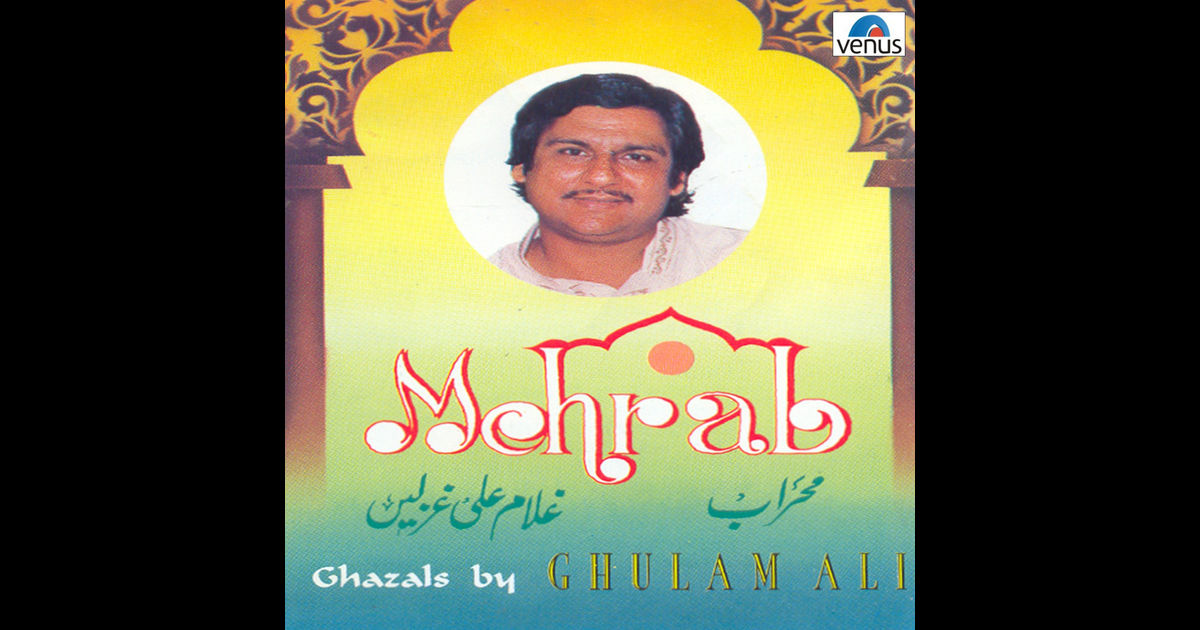

Phoolon mein bhi shokhi to hai kisko magar tujhsa kahoon My favourite Ghulam Ali song? There’s one obvious choice, and the poetry is so beautiful that I will put down the entire thing here:Īye husn-e-beparwah tujhe shabnam kahoon shola kahoon Some songs whose poets I don’t know, like ‘Apni tasveer ko aankhon se lagaata kya hai’ and ‘Jinke honton pe hansi’. Gulzar’s ‘Mera kya tha tere hisaab mein’. Qateel Shifai’s ‘Kiya hai jise pyaar hamne zindagi ki tarah’. Qamar Jalalabadi’s ‘Kehte hain mujhse ishq ka afsaana chahiye’. Khatir Ghaznavi’s ‘Kaisi chali hai abke hawa’. For a brief while, it was Rifat Sultan’s ‘ Bahaaron ko chaman yaad aa gaya hai’.

Many years later, it was Syed Razid-e-Ramzi’s ‘Paara paara hua pairaahan-e-jaan’. Then, ‘Faasle aise bhi honge’ came along, followed by ‘Dil mein ek lehar’.

Earlier on, it was Nasir Kazmi’s ‘Apni dhun mein rehta hoon’. Many Ghulam Ali songs have been personal favourites at different points in time. After each encounter, I would explore more and more of his music. The third was during a private mehfil hosted at the place of an income-tax officer about 10 years ago, where Ghulam Ali sang for three hours, his voice in perfect shape. One was during an interview, and one was at a select gathering hosted by Saregama HMV to mark the launch of ‘Visaal’, an album featuring Ghulam Ali and Gulzar. And though Mehdi-saab has remained a bigger favourite ever since, Ghulam Ali kept coming back in phases.Īs a journalist covering the music beat for Mumbai’s Mid Day newspaper, I was lucky to have interacted with the legend thrice. But what I loved about both singers was the sheer beauty and expression of their voices. After getting hold of a Ghulam Ali greatest hits compilation cassette, I was immediately hooked to ‘Hungama’ and Mohsin Naqvi’s ‘Yeh dil yeh paagal dil mera’, also known as ‘Awaargi’.įor over a year, I would listen to that compilation regularly, till the Ghulam Ali fever was broken the following year when I heard an LP of Mehdi Hassan singing Hafeez Hoshiarpuri’s ‘Mohabbat karne waale kam na honge’ and Ahmed Faraz’s ‘Ranjish hi sahi’.Īt that point, my understanding of the technicalities of music was very basic, and knowledge of Urdu limited.
#Ghulam ali ghazals list full#
The ghazal craze was in full swing in India, with Jagjit-Chitra Singh, Pankaj Udhas, Rajendra-Nina Mehta and Talat Aziz doing regular concerts and albums. I simply loved his voice, though it took me another year to hear his other songs. LIKE many Indian ghazal fans from my generation, I was first exposed to Ghulam Ali’s voice in 1982, when ‘Chupke chupke raat din’ was used in B R Chopra’s film ‘Nikaah’. With part of the proceeds going towards drought relief, it served a noble purpose too. Musically too, the concert was of the highest quality, with perfect assistance on the tabla, sitar, violin, keyboard and guitar. That’s not to take away from the overall charisma he displayed throughout the concert, interspersing the music with witty remarks, sometimes targeted at errant members of the audience, and sometimes playfully teasing his accompanying musicians. But one clearly noticed it when he was singing the straighter lines, mainly in the middle register. Strangely, it didn’t seem so obvious on the sargams and taans, which have been drilled to perfection through his Patiala gharana training and years of riyaaz. He’s 72 now, and like most septuagenarian singers, his voice showed a certain coarseness, especially if one compares it with the sheer brilliance of the texture we all have grown up on. While the evening was a surefire trip down nostalgia lane, one couldn’t help but notice how Ghulam Ali’s timbre has changed. For over two hours, he charmed the appreciative audience with a set-list that also included Nasir Kazmi’s ‘Neeyat-e-shauq bhar na jaaye kahin’, Dagh Dehlvi’s ‘Tumhare khat mein ik naya salaam kiska tha’, Ibn-e-Insha’s ‘Yeh baatein jhooti baatein hain’, Athar Nafees’ ‘Sochte aur jaagte saanson ka ek dariya hoon mein’ and Masroor Anwar’s ‘Hum ko kiske gham ne maara’, before concluding with shorter versions of Hasrat Mohani’s ‘Chupke chupke raat din’ and Akbar Allahabadi’s ‘Hungama hai kyon barpa’. Likewise with Nasir Kazmi’s ‘Dil mein ek lehar si uthi hai abhi’, where ‘lehar’ gets the same magical treatment.īoth these songs were the high points of the Pakistani maestro’s concert at Mumbai’s Shanmukhananda Hall on Friday night. Whenever one hears it, one is simply enamoured by the way he keeps repeating the word ‘faasle’, almost making it sound like a different song each time. Take the Adeem Hashmi-penned ‘Faasle aise bhi honge’. THE special thing about Ghulam Ali’s style of concert singing is the way he takes specific words or phrases and repeats them in a variety of ways, altering their range or volume.


 0 kommentar(er)
0 kommentar(er)
